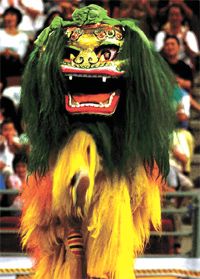英文故事剧 年兽(The Monster Nian)
英语课
传说“年”是一只很可怕的怪兽。因为它很怕热又喜欢睡觉,所以平常都住在山里,而且它一睡就是一整年,到了年底的时候才会醒来。醒来以后,它就会下山找东西吃,无论是人或动物它都吃。人们都很怕这只怪兽,所以只好带家人到别的地方躲起来,等到年走了以后才敢回家。后来,有个聪明的人想到了一个好办法。他建议人们利用燃烧竹子的火光和爆破的巨响来把年吓走。就在一年的最后一个晚上,大家把竹子准备好,紧张地等着年的出现。突然有人大喊“年来了!年来了!”所有的人就一起点燃竹子。然后躲到房子里。果然,可怕的年兽被燃烧竹子的火光和爆破的巨响吓跑了,再也不敢出来吃人。从此以后,人们到了一年的最后一个晚上,都会燃放爆竹。

Chinese New Year is now popularly known as the Spring Festival because it starts at the beginning of spring. Its origin is too old to be traced. All agree though that the word "nian," which in modern Chinese only means "year," was originally the name of a monster that started to prey 1 on people the night before the beginning of a new year.
A long time ago there was a monster called Nian. It was very ugly and ferocious 2. The monster would come down from the mountains to hunt people. People were very afraid of it and locked themselves inside their houses before sunset on the days it would come.
There lived an old wise man in a village. He thought it was the panic in people that made the monster so bold and furious. Thus the old man asked people to organize together and to conquer the monster by means of beating drums and gongs, burning bamboo and lighting 3 fireworks in the hope that the noises would frighten the hateful monster.
On a moonless and freezing cold night, the monster Nian appeared again. The moment it opened its mouth, the villagers burst out with their frightening noises and fire. Wherever the monster went, it was faced with the terrible noises.
The monster was forced around until it fell down in exhaustion 4 and was then killed. Savage 5 as the monster was, he lost in the end to the cooperation of the villagers.
Since then, people have kept the tradition by beating drums and gongs, and lighting fireworks on the coldest day in winter to drive the imaginary monster away and to celebrate victory over it. They also wear red clothes to scare the monster.
Today, "nian" refers to New Year's Day or the Spring Festival. People often say "guo nian," which means "survive the nian." Red has become the color of joy.

Chinese New Year is now popularly known as the Spring Festival because it starts at the beginning of spring. Its origin is too old to be traced. All agree though that the word "nian," which in modern Chinese only means "year," was originally the name of a monster that started to prey 1 on people the night before the beginning of a new year.
A long time ago there was a monster called Nian. It was very ugly and ferocious 2. The monster would come down from the mountains to hunt people. People were very afraid of it and locked themselves inside their houses before sunset on the days it would come.
There lived an old wise man in a village. He thought it was the panic in people that made the monster so bold and furious. Thus the old man asked people to organize together and to conquer the monster by means of beating drums and gongs, burning bamboo and lighting 3 fireworks in the hope that the noises would frighten the hateful monster.
On a moonless and freezing cold night, the monster Nian appeared again. The moment it opened its mouth, the villagers burst out with their frightening noises and fire. Wherever the monster went, it was faced with the terrible noises.
The monster was forced around until it fell down in exhaustion 4 and was then killed. Savage 5 as the monster was, he lost in the end to the cooperation of the villagers.
Since then, people have kept the tradition by beating drums and gongs, and lighting fireworks on the coldest day in winter to drive the imaginary monster away and to celebrate victory over it. They also wear red clothes to scare the monster.
Today, "nian" refers to New Year's Day or the Spring Festival. People often say "guo nian," which means "survive the nian." Red has become the color of joy.
1 prey
n.被掠食者,牺牲者,掠食;v.捕食,掠夺,折磨
- Stronger animals prey on weaker ones.弱肉强食。
- The lion was hunting for its prey.狮子在寻找猎物。
2 ferocious
adj.凶猛的,残暴的,极度的,十分强烈的
- The ferocious winds seemed about to tear the ship to pieces.狂风仿佛要把船撕成碎片似的。
- The ferocious panther is chasing a rabbit.那只凶猛的豹子正追赶一只兔子。
3 lighting
n.照明,光线的明暗,舞台灯光
- The gas lamp gradually lost ground to electric lighting.煤气灯逐渐为电灯所代替。
- The lighting in that restaurant is soft and romantic.那个餐馆照明柔和而且浪漫。
4 exhaustion
n.耗尽枯竭,疲惫,筋疲力尽,竭尽,详尽无遗的论述
- She slept the sleep of exhaustion.她因疲劳而酣睡。
- His exhaustion was obvious when he fell asleep standing.他站着睡着了,显然是太累了。